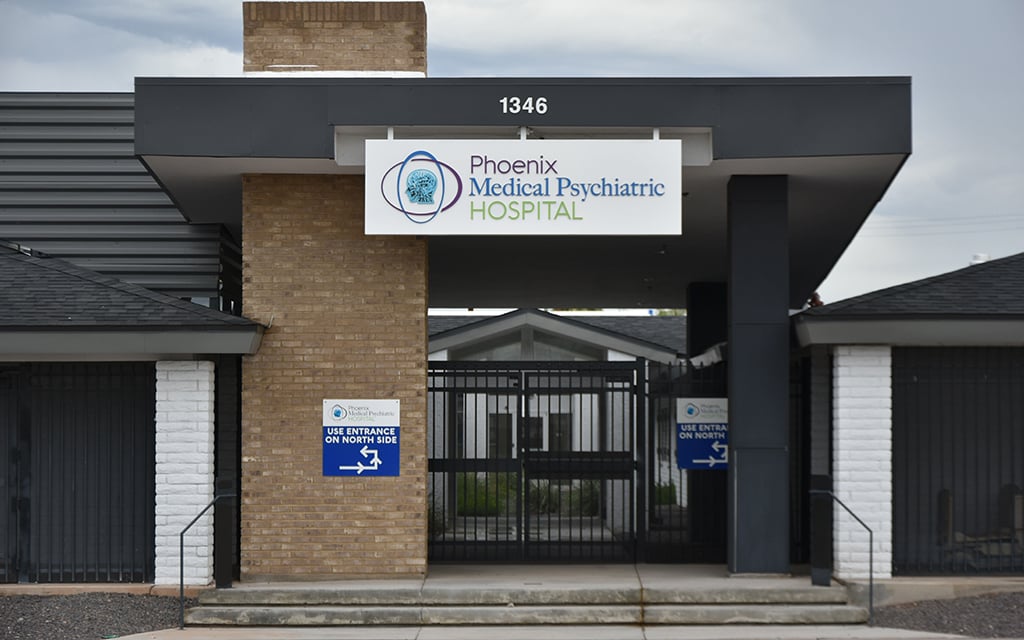Jane Jepson remembers when her son, Nick, first came back home in 2017. He was working as a bellman, traveling across the country, from Alaska to Virginia.
“He was so excited,” Jepson recalled fondly. “He looked so handsome and so strong and in such good shape.”
However, a few weeks later, Jepson received strange phone calls from Nick.
“He couldn’t sleep. He was telling me his roommates were after him, and all of Massachusetts was involved in an international conspiracy with the Illuminati. And I thought, ‘he needs to come home and take a rest.’ So I flew him home to his bedroom, and (he) sat in his bedroom for six months.”
Nick, who was later diagnosed with schizophrenia, lost dozens of pounds and experienced severe delusions of being watched that caused him to cover his phone camera and close all the blinds. He accused Jepson of not being his real mother and threatened to murder her and his sister in their sleep.
Nick was placed on a 72-hour involuntary hold at the Urgent Psychiatric Center at what was then Phoenix Memorial Hospital. The center does not provide long-term care, so Nick had to be transferred to what was then Desert Vista Hospital.
But the hospital was at capacity, and Nick stayed at the UPC for another 72 hours until Desert Vista had an available bed.
Jepson, who later joined Arizona Mad Moms and NAMI Arizona, two advocacy groups that assist people with mental health illness, said Nick got lucky.
“We had been seeing families…that went through this very same process. People who were very, very ill and then they would end up at UPC (Urgent Psychiatric Center) for a 72-hour hold, but there were no treatment beds…The individual would just walk out the front door… make their way home, and they’re extremely mad and irritated at their families,” Jepson said.
Over 15 million Americans live with Serious Mental Illness, according to the 2022 data from the Substance Abuse and Mental Health Services Administration (SAMHSA), with nearly 311,000 living in Arizona. Many of them, like Nick, need intensive treatment for illnesses such as schizophrenia, psychosis or severe delusions.
Multiple hospitals in the state are currently at capacity and have turned away patients in recent months, and those who do get beds are often discharged prematurely.
Rachel Streiff, legal guardian of a woman with SMI, and Crystal Fox founded Mad Moms this year, after Fox’s son, Joshua, killed her husband, John, during a schizophrenic episode. Joshua was sent to Alhambra unit of Arizona State Prison Complex, but was mistakenly placed in the general population and hung himself within the first two days after arriving.
Mad Moms started as an effort to seek justice and hold the government responsible for Joshua’s death. Since then, the group has grown to over 360 families.
This shortage of beds at inpatient centers hasn’t improved, and the recent closure of one of the remaining psychiatric facilities, St. Luke’s Behavioral Health Center in Phoenix, isn’t helping.
The Arizona Department of Health Services (ADHS) suspended the hospital’s license after they found a number of issues, including broken AC and unsanitary conditions.
In an official statement to Cronkite News, agency Executive Deputy Director Jennie Cunico explained the closure: “ADHS took swift action to address health and safety concerns and protect patients at St. Luke’s Behavioral Hospital in Phoenix. Our priority is always the health, safety, and well-being of patients. We acknowledge the impacts the hospital’s closure may have on the larger behavioral health system and we remain committed to partnering with state agencies and the larger behavioral health system.”
The parent company of St. Luke’s, Steward Health Care, is entangled in numerous financial troubles. The company declared bankruptcy in May and since then has been subjected to multiple lawsuits. In spite of receiving a $225 million loan in June, over 30 of Steward’s hospitals across the country have been auctioned off in court or forced to close.
As of August, St. Luke’s had furloughed more than 200 employees, leading to 127 beds becoming inoperable and the transfer of over 70 patients, including 22 minors, with SMI to other facilities such as Phoenix Medical Psychiatric Hospital (PMPH).

The Phoenix Medical Psychiatric Hospital has 96 beds in total and, with only a few available. (Photo courtesy of Phoenix Medical Psychiatric Hospital)
The closure increased demand for PMPH, which has 96 beds in total and only a few available. Out of the 96, 24 are for involuntary treatment and currently have no availability. In the past three years, the demand for beds more than doubled.
Both prior to and following the closure of St. Luke’s, PMPH played an active role in providing support by sending cold water and food and receiving transferred patients.
“These are our colleagues, our social workers and nurses and case managers. And it could have been us,” said Jenny Dwyer, clinic director at PMPH.
For years, St. Luke’s was criticized by many former patients, with reviews citing its rundown and dirty condition, moldy showers, uncomfortable bedding and cold food. But the closure leaves a large need in the community for mental illness treatment, especially involuntary.
“It wasn’t the best treatment, it wasn’t staffed with the best care, but they had a bed and I was just so grateful that there was a place for Nick to go that you kind of suspend your standards,” Jepson said.
Last month, HonorHealth, one of the largest health-care systems in the state, bought four Steward-owned hospitals in Arizona, but St. Luke’s was not one of them. Todd LaPorte, CEO of HonorHealth, said in a press conference that they “were never asked to assume the management responsibilities for that facility. It was understood that they (Steward) had a more national strategy for what to do with behavioral health facilities throughout the Steward’s national footprint.”
St. Luke’s and Steward both did not respond to requests for comment.
While involuntary mental hospital stays are criticized by some as forced and expensive, Jepson suggests that court-ordered treatment is often crucial for individuals with schizophrenia and similar SMIs, as they can refuse medication and help.
Her son experiences anosognosia, which is an inability to recognize there’s anything wrong with him, a common symptom for people with severe mental disorders.
“There is no liberty in a mind that is diluted and has no agency or competency to make a good treatment decision for themselves,” Jepson said. “You restore someone’s liberty by restoring their cognitive function, by treating them and getting them out of psychosis.”
Individuals with these conditions can become resistant, even violent, when asked to receive treatment. According to a NAMI study, about a quarter of individuals with a SMI have been arrested, leading to over 2 million convictions.
Among those convicted, non-white individuals, especially Black inmates, are more likely to be held in solitary confinement, be injured and stay longer in jail. Black people with SMI are also more likely to receive involuntary treatment, physical and chemical (such as drugs for sedation) restraints, or assisted outpatient treatment, due to higher rates of being uninsured and lack of affordable treatments.

Arizona Mad Moms at a legislative meeting at the Arizona State Capitol. (Photo courtesy of Arizona Mad Moms)
“The fewer beds that we have available, the more these very ill citizens get diverted into the criminal justice system,” Jepson said. “In our jails, they’re not assertive with treating psychiatric illness. They tend to just put them in a solitary cell, untreated.”
Family members are hesitant to seek treatment for their relatives, putting themselves at risk, Mad Moms co-founder Streiff said. “When, as a community, we don’t provide appropriate care for the sickest patients, people, especially mothers and fathers, get hurt,” she said.
The Biden administration awarded $68.5 million for “behavioral health, education, training, and community programs,” but less than one-fourth of the funding is going toward treatment for those experiencing SMI.
“We are seeing a lot of funding for general mental health … at the expense of our sickest patients with SMI that are ending up on the streets, in jails or dead,” Streiff said.
Mad Moms advocates for approving hospitals for the Institution for Mental Disease (IMD) Exclusion Waiver for SMI treatment, which would provide inpatient mental facilities federal funding for a patient stay of up to 15 days a month rather than 72-hour holds. The group also says improving salaries and training, as well as community and stakeholder meetings, could lead to improvements in the system.
Though Nick is now stable and taking medication, Jepson remains painfully aware that any disruption in his care could plunge him back into paranoia and psychosis, leaving him and his family once again in a state of desperate need for a hospital bed.
“We don’t want luck to have anything to do with treatment decisions and the trajectory of our loved ones,” Jepson said. “If Nick had not had luck on his side, he would be incarcerated, if he survived.”


